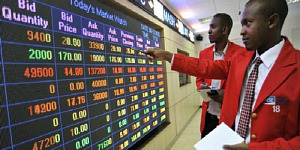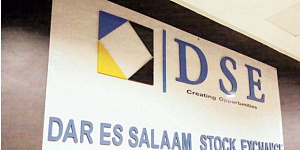The Dar es Salaam Stock Exchange has been demutualised and in the next few days, it intends to conduct its initial public offering (IPO) and eventually self-list into the stock exchange. This may not sound familiar to many - but I will explain.
What is demutualisation? In the strictest sense, demutualisation refers to the change in legal status of the stock exchange from a mutual entity/association, into a company limited by shares (with majority-based decision based).
Normally, demutualisation makes sense if it is induces a change in the stock exchange's objectives from managing interests of a closed member-based organisation - with the central focus on providing benefit primarily of the member/brokers and keeping costs of investments limited to financing needs of members - into a company set up with the objectives of maximizing the value of investment by focusing on generating profits from servicing the demands of their customers (brokers, listed companies and investors) in a competitive manner.
The idea of stock exchange's demutualisation has captured media headlines in recent years. A number of exchanges across the globe have demutualised since this idea came into the public attention, especially after the first incident of demutualisation, by the Stockholm Stock Exchange in 1993. According to the World Federation of Exchanges (WFE); as in year 2015, more than 85 percent of all stock markets in the World had been demutualised, and about 45 percent of all stock exchanges are publicly listed. How did this come about? why this phenomenon?
Globalisation and financial integration, the need for enhanced corporate governance, the development of innovative technology, regulatory reforms and changes in investment opportunities are some affected the environment for stock exchanges. There has also been an increasing competition that is affecting the functioning of financial markets. In response to this new financial environment, a growing number of stock exchanges have demutualized and opted to go public.
Traditionally, exchanges functioned as markets protected under national auspices because they represented national identities and enjoyed a monopolistic or near monopolistic position. Governments have been keen to ensure stock exchanges get into their feet -- mainly because it is of national interest to have a vibrant stock market in a country, however, there comes a point where private sector and its enterprising and profit-seeking spirit have to come into play, i.e. by capitalising the stock market, ensure there is good governance and protection of all its stakeholders instead of focusing on serving interest of members only.
For a long time, exchanges were mutually-owned organizations where members (brokers, dealers, custodians, listed companies, etc) were also owners of the exchange with all the voting rights given by ownership. This monopolistic market view of stock exchanges became progressively obsolete during the last 20 years due to powerful developments in the environment in which exchanges operate.
With these changes in the financial environment, exchanges began to make focused efforts to attract investors and increase their market share. They had to rethink their traditional ownership structure in favour of a structure which accounts for the evolving exchange environment better and reassess their business strategies to face growing market competition.
Since mid-1990s growing number of exchanges are opting to demutualize in the new environment, shifting from mutually-owned not-for-profit organizations into for-profit, investor-owned firms. Among other many benefits, this process offers the advantages of a separation between trading rights and ownership since shareholders provide capital to exchanges and receive profits but do not need to conduct trading on the exchange.
With demutualisation, the objectives of exchanges should, in principle, change from focusing primarily on the interests of members/brokers and keeping costs and investments limited to financing approved firms that maximize profits by responding in a competitive manner to customer needs.
Demutualisation can take different forms. The exchange can opt for a for-profit private company structure, where only members or members and outside investors are the owners. The second option is to be a listed company with restrictions on the number of shares that can be owned by exchange members and non-members or, alternatively, without restrictions on trading. The added advantage to this second option is that the Exchange is also able to mobilise its financing from a wider source of investment community who then becomes owners of the Exchange.
Does the fundamental roles and the services offered by the exchange changes following the demutualisation process? Largely, NO. A demutualised stock exchange continues to offers a host of services to listed companies, brokers and investors. These includes: (i) Listing of securities (shares, bonds, derivatives, etc) after capital raising or by introduction; (ii) providing liquidity and price discovery for listed securities; (iii) execution of services (trades, settlements, depository); (iv) signalling function for listed companies; (v) monitoring of trading to prevent manipulation and insider trading; (vi) ensure there are standard rules that governs market activities; (vii) ensure clearing of buy and sell transactions. We, at the Dar es Salaam Stock Exchange have been demutualised, will shortly conduct an IPO and then self list; being the third Exchange in Africa to demutualise coming after Johannesburg Stock Exchange and Nairobi Securities Exchange.
What will DSE demutualisation mean for us as a Country? (i) enhancement of the DSE's financial and operational capacity; (ii) enhancement of good corporate governance for sustainable protection of all DSE's stakeholders; (ii) increased access to the efficiently priced source of funds to finance the Exchange's growth and capital markets development in the country, including capital investments in trading technologies as well as introduction of new products and services; and (iii) enhance our efficiency is responding to the increased competitiveness within regional financial markets centres in relation to finance and investment choices and allocations.
Moremi Marwa, Is the CEO of the Dse PLC.
















































